Bulgaria’s housing market recovering
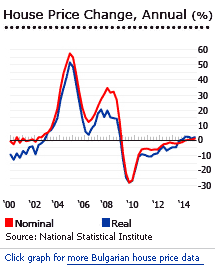 Bulgaria’s housing market is recovering, despite meagre economic growth, and property transactions are starting to pick up.
Bulgaria’s housing market is recovering, despite meagre economic growth, and property transactions are starting to pick up.
In 2014, the average price of existing flats in Bulgaria increased 1.15% to BGN 874.49 (€447.02) per square metre (sq. m.), the first year-on-year increase since 2008, according to the National Statistical Institute (NSI). When adjusted for inflation, the price of dwellings actually increased 2.05% last year. In Sofia, the capital, the average price of dwellings was up by 3.1% in 2014 from a year earlier, at BGN1,501.73 (€767.75) per sq. m.
Bulgarian property prices are now 38.3% (-44% in real terms) lower than at their Q3 2008 peak, when average national prices reached BGN1,418.24 (€724.97) per sq. m.
Out of 28 provinces of Bulgaria, ten provinces saw house prices increase in 2014, including Stara Zagora, with an annual house price rise of 4.8%, Burgas (4.6%), Shumen (4.2%), Veliko Tarnovo (3.6%), Silistra (3.6%), Plovdiv (2.6%), Ruse (1.6%), Varna (1.4%), and Kardzhali (1.4%). There were price drops in Kyustendil (-6.3%), Pernik (-5.7%), Sliven (-4.1%), and Pleven (-4%).
From 2000 to 2008, Bulgaria had a house price boom, with residential property prices surging around 300%. The bubble burst at the end of 2008:
- In 2009, Bulgaria´s average dwelling price plummeted by 26.31% (-26.72% in real terms);
- In 2010, the average dwelling price fell by 5.58% (-9.68% in real terms);
- In 2011, the average dwelling price fell by 6.16% (-8.67% in real terms);
- In 2012, the average dwelling price fell by 1.4% (-5.42% in real terms);
- In 2013, the average dwelling price fell 1.21% (but increased 0.38% in real terms).
The current recovery is expected to continue. Demand for properties in the major cities will grow, and the supply will become increasingly limited due to the low levels of new construction, according to local property experts.
“An important element of the new market reality is the return of the confidence in the property market. More and more buyers are thinking of buying property because real estate is a safe real asset and good investment,” says Polina Stoykova of Bulgarian Properties. “It is clear and obvious that the buyers have permanently returned,” Stoykova added.
European Union citizens can now purchase properties in Bulgaria, including land. The 5-year moratorium on land purchases, set as a condition in the Accession Treaty between Republic of Bulgaria and The European Union, was lifted in January 1, 2012.
Previously, foreigners could purchase land only in the name of a legal entity and were not allowed to own a property. The lifting of the ban now gives European citizens the right to own property as individuals.
Demand is picking up again
Property transactions in Bulgaria, particularly in Sofia, continue to pick up. Three- and four-bedroom apartments were the most sought after properties in 2014, representing about 70% of all property sales, according to local property experts. About 70% of all property sales were purchased on a cash-basis.
Residential construction recovering
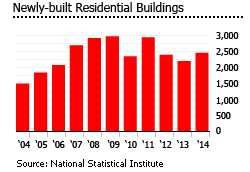
In 2014, the number of newly-built residential buildings rose 11.96% from a year earlier, to 2,462 buildings, according to the National Statistical Institute (NSI), in contrast to the declines of 8.34% in 2013, and 18.65% in 2012.
As of December 2013, the country’s total dwelling stock stood at 3,918,241 units, up slightly by 0.2% from a year earlier, according to the NSI.
Low interest rates
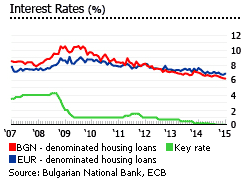
Interest rates in Bulgaria continue to decline. The average mortgage interest rate for BGN-denominate loans was 6.18% in January 2015, down from 6.97% in the same period last year, according to the Bulgarian National Bank.
For BGN-denominated loans:- Interest rate fixation (IRF) of up to 1 year: 6.19%, down from 6.99% from a year earlier - and the lowest rate for eight years
- IRF over 1 and up to 5 years: 5.9%, down from 6.17% from a year earlier
Likewise, the average mortgage interest rate for Euro-denominated loans also fell to 6.83% in January 2015, from 7.59% in January 2014. Over the same period, for Euro-denominated loans:
- IRF of up to 1 year: 6.82%, down from 7.53% from a year earlier
- IRF over 1 and up to 5 years: 7%, up from 6.91% from a year earlier
Small mortgage market
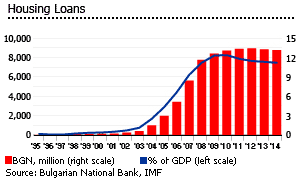
Bulgaria’s mortgage market expanded during the boom years from just 0.39% of GDP in 2000, to 12.35% of GDP in 2010. Mortgage loans outstanding were 11.18% of GDP in 2014.
Credit demand remains weak. The total amount of outstanding housing loans dropped 1.4% y-o-y to BGN8.69 billion (€4.44 billion) in February 2015, despite record-low interest rates, according to the Bulgarian National Bank.
Moderate rental yields
In the centre of Sofia, gross rental yields on apartments are moderate, ranging from 4.64% to 5.97%, based on recent Global Property Guide research conducted in August 2014.
In the southern part of Sofia in Vitosha Mountain (or in the vicinity) there are prestigious suburban neighborhoods like Boyana and Dragalevtsi. Small apartments in the area offer better yields of up to 6.53%, and the very biggest apartments command exceptional yields at 8.36%.
Meagre economic growth in 2015
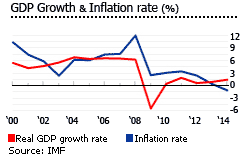
Bulgaria’s economy expanded by 1.5% in 2014, after growing by 1.1% in 2013 and 0.6% in 2012, according to the European Bank for Reconstruction and Development (EBRD).
The economy was projected to grow by 0.8% this year and by another 1% in 2016, according to the European Commission. The World Bank is more optimistic about Bulgaria’s economy, with growth forecasts of 1.1% in 2015, 2% in 2016 and 2.7% in 2017.
In 2014, the country’s budget deficit rose to 3.7% after a budget amendment and thus exceeded the EU deficit limit of 3%. In November 2014, Bulgaria’s parliament approved a 2015 budget with deficit equivalent to 3%. The deficit for the first two months of this year was just 0.2% of GDP, the lowest in the past five years. State debt is expected to increase to BGN24.5 billion (€12.52 billion) or about 30% of GDP.
The country had negative inflation of -1.7% in February 2015, after -2.3% in January 2015, according to the Eurostat.
Unemployment is expected to fall to 10.9% in 2015, according to the European Commission.